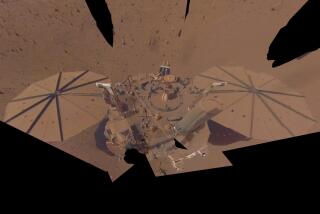Phoenix Mars lander finds liquid water, scientists say
- Share via
A team of scientists believes it has found strong evidence of liquid water on Mars, a discovery that would greatly increase the likelihood that some form of life may exist on the Red Planet.
The findings are controversial because there is disagreement among researchers over the evidence, which came from the Phoenix Mars lander’s mission last year to the planet’s north pole.
Phoenix was dispatched to Mars in search of ice and found it only a few centimeters under the surface of the northern polar region. But researchers generally believed that the chilly temperatures on Mars, reaching minus 200 degrees Fahrenheit at the poles in winter, ruled out the formation of liquid water. They believed that ice exposed to the atmosphere would not melt, but sublimate directly to a vapor.
Now, nearly two dozen scientists connected with the Phoenix mission, including lead scientist Peter Smith of the University of Arizona, have signed on to a research paper: “Physical and Thermodynamical Evidence for Liquid Water on Mars.” It will be presented at the 40th Lunar and Planetary Science Conference on March 23 in The Woodlands, Texas, north of Houston.
The evidence offered for liquid water is a series of photographs of globules on one of Phoenix’s leg struts. Advocates say the globules were splashed up on the strut during the landing on May 25, 2008. The authors point to pictures that they say show the globules moving and merging over time.
Another Phoenix scientist, Michael Hecht of the Jet Propulsion Lab in La Canada Flintridge, is skeptical of his colleagues’ assertions. The photographic images are grainy and unconvincing, and the globules are probably particles of ice, not water, he said.
But it is still quite possible, he added, that water could exist in liquid form on Mars, in a brine, even at very cold temperatures, because salt lowers the freezing point of ice. “That’s one of the exciting things” about Phoenix’s discovery of salty soil, he said.
--






